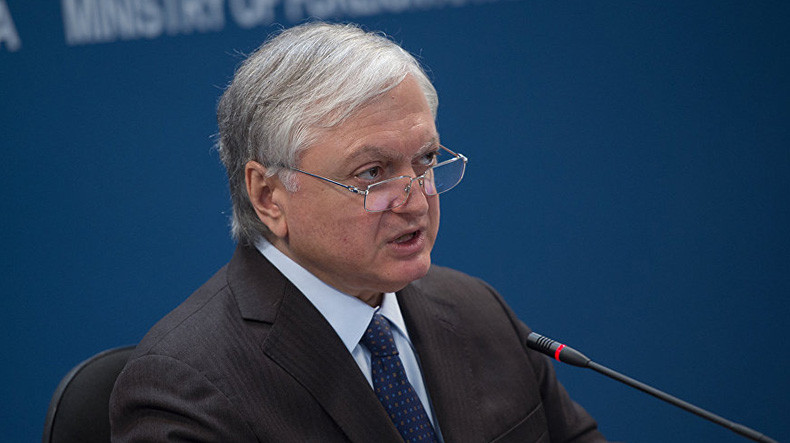
Azerbaijan fails to respect the reached agreements - FM Nalbandian
"Azerbaijan backtracked from the agreements reached at the Vienna and St. Petersburg Summits refusing to implement them. This concerns first and foremost to the creation of the mechanism for investigation of the ceasefire violations and the expansion of the monitoring capacities of the team of the Personal Representative of the OSCE Chairperson-in-Office, and of course the strict adherence to the trilateral ceasefire agreements of 1994-1995," Armenian FM Edward Nalbandian stated on Wednesday during remarks at the Committee on Foreign Affairs of the European Parliament.
In Nalbandian's words not only Armenia but the Co-Chairs also have continuously stressed the necessity of respecting commitments reached at the Summits and the last such statement was made only days ago. "Azerbaijan fails to respect the agreements. The recent most illustrative case was the meeting of the Foreign Ministers of Armenia and Azerbaijan in Krakow in January, where was agreed in principle to implement the expansion of the Office of the Personal Representative. Armenia and the Co-Chairs issued almost identical statements reflecting this agreement while Azerbaijan has not made any reference to it either after the meeting or up to now. When the Co-Chairs were back to the region few days ago, Azerbaijan again failed to honor the implementation of the agreement on the expansion" said the foreign minister.
"On February 8th the President of Azerbaijan declared that different regions of Armenia, including its capital Yerevan are historic lands of Azerbaijan, where Azerbaijanis must return and that it is Baku's political and strategic goal. I will leave to your consideration if this is a territorial claim towards a neighboring country, saber-rattling, or something else. But, it is well known that Baku's belligerence on use of force and threat of force have many times turned into real actions," Nalbandian stated
Nalbandian next highlighted the need for the international community to speak in one voice with the Co-Chair countries to support their approaches with the aim of advancing the peace process. "All conflicts are different, and it is not possible to put them together or address in the same cluster. There are diverse approaches of the international community in dealing with the different conflicts. In the case of the Nagorno-Karabakh peace process the Co-Chair countries have reiterated on numerous occasions, including at the level of presidents, that three principles of the international law form the basis of the Nagorno-Karabakh conflict resolution, namely the non-use of force or threat of force, territorial integrity, and the equal rights and self-determination of peoples. These principles were elaborated by the Co-Chairs as an integrated whole and, as they stated, any attempt to select one of them at the expense of others would make it impossible to come to a settlement," noted the minister
In his words, any deviation from this compromise language proposed by the impartial mediators would damage the concerted efforts of the international community, would undermine the work of the Co-Chair countries, would send a false signal of disunity that may be exploited by the enemies of peace and eventually may derail the peace talks, open the door for new hostilities.
"The position and language of those who have declared their support to the Co-Chairs approaches could not differ from one document to another. It should be made clear once and forever that there is no alternative to the negotiated solution proposed by the Minsk Group Co-Chairs, including the three principles of international law suggested by them as the basis for the conflict resolution," said the minister, adding Armenia has continuously reiterated that will continue its efforts together with the Co-Chair countries towards exclusively peaceful settlement of the Nagorno-Karabakh conflict.
Newsfeed
Videos






























